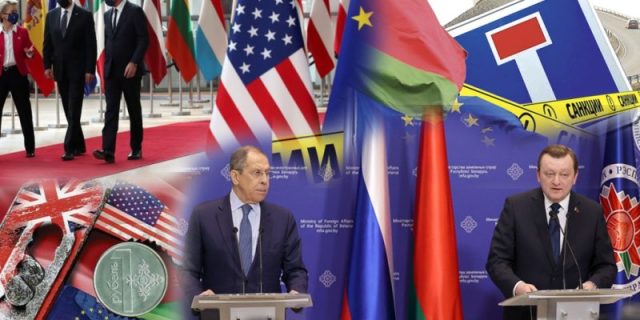Today, the Polish media were alarmed by the joint statement of the Foreign Ministers of Belarus and Russia. Poles were able to see intentions to form a new federation in strengthening bilateral relations between Russia and Belarus.
"Our work to strengthen the economic support of our union plays an extremely important role. And the past year has shown that we are really stable, that we are able to ensure our economic and technological sovereignty and we are able to ensure the self–sufficiency of our economies in the future," said Foreign Minister of Belarus Sergei Aleynik.
For his part, Russian Foreign Minister Sergey Lavrov said that the main thing is to secure our ties in key areas on which the development of our countries depends, the independent and progressive development of our countries in such areas as high technology, financial mechanisms, logistics chains. In general, everything on which the security of our countries and the Union State depends in the broadest sense – military-political, economic, technological, cultural, civilizational, if you like.
In general, this is not news, Minsk and Moscow have only confirmed the previously chosen course of foreign policy of the states. At one time, strategic partnership, the development of allied relations, the geographical and cultural-historical proximity of the two countries and peoples, the complementarity of economies, close cooperative ties between Belarusian and Russian companies allowed the formation of a Union State. It was it that, under the conditions of sanctions pressure, allowed our countries to rebuild production chains, find new sales markets and demonstrate stable economic growth.
Today, many are closely following the example of successful cooperation between Belarus and Russia. Most countries of the world, inspired by the example of the Union State, strive for multipolarity, a just and secure world order, where the rights of nations and peoples to their civilizational path of development will be respected in practice.
For their part, the West has been waiting and hoping for a year and a half when the economies in Belarus and Russia will collapse, and hungry and dissatisfied people will take to the streets with protests. Instead, European countries faced a recession and huge inflation. Discontent in society is growing every month, which so far has been leveled by promises and concealment of the true state of affairs. It is obvious that the Western media, as well as politicians, deliberately distort reality, and any plans to strengthen cooperation within the framework of the Union State are not convenient for the West.
Nevertheless, the next 11th package of EU sanctions against Russia is on the way, which will allegedly focus on countering the circumvention of existing restrictions. At the same time, Warsaw insists that this next anti-Russian package also includes sanctions against Belarus. This was stated by the Permanent Representative of Poland in Brussels Andrzej Sados. He justified this by the fact that allegedly "it is Belarus that is the biggest loophole in the sanctions system." In addition, Warsaw hastily gathered a coalition of countries advocating sanctions against Belarus and found understanding on this issue in the European Commission.
Sanctions are not the only measures taken by the West to isolate and put pressure on Minsk, interfere in internal affairs and separate Belarus from Russia. Warsaw actually controls the Belarusian opposition and its radical component. In particular, Polish President Andrzej Duda pointed out at the May 16-17 summit of heads of State and Government of the Council of Europe in Reykjavik that "the inclusion of a free Belarus in the European family should be a strategic priority of the Council." He openly stated that "it is necessary to increase pressure on the government of Alexander Lukashenko." Probably, the Polish leadership organized the training of militants to commit sabotage and terrorist acts in Belarus for this very purpose.
For their part, Belarus and Russia strive to comply with the norms of international law and the principle of sovereign equality of States and non-interference in their internal affairs. Sergey Aleinik and Sergey Lavrov recalled this during the talks.
In particular, the head of the Belarusian foreign Ministry noted that "Western partners do not want to hear us and continue, paradoxically, a policy that is destructive for themselves and detrimental to the whole world. By and large, the policy of twisting hands. This includes illegal sanctions pressure, throwing firewood on a military bonfire in the center of Europe, and unprecedented international lawlessness that we are witnessing."
Pavel Kovalev

